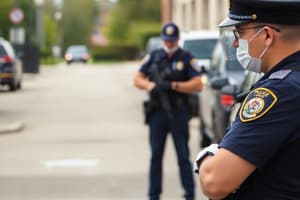Podcast
Questions and Answers
Who is regarded as the 'Father of Criminal Identification'?
Who is regarded as the 'Father of Criminal Identification'?
What did Sir Francis Galton propose regarding fingerprint patterns?
What did Sir Francis Galton propose regarding fingerprint patterns?
What significant system did England establish in 1900 regarding fingerprints?
What significant system did England establish in 1900 regarding fingerprints?
Which individual made the first criminal fingerprint identification in 1892?
Which individual made the first criminal fingerprint identification in 1892?
Signup and view all the answers
How did the Chinese utilize fingerprints three thousand years ago?
How did the Chinese utilize fingerprints three thousand years ago?
Signup and view all the answers
What findings did Sir Francis Galton publish in his 1892 work titled 'Fingerprints'?
What findings did Sir Francis Galton publish in his 1892 work titled 'Fingerprints'?
Signup and view all the answers
Which term refers to the specific characteristics used to identify fingerprints?
Which term refers to the specific characteristics used to identify fingerprints?
Signup and view all the answers
What was one of the first uses of fingerprints in a legal context?
What was one of the first uses of fingerprints in a legal context?
Signup and view all the answers
What is the primary objective of a criminal investigation?
What is the primary objective of a criminal investigation?
Signup and view all the answers
From which language does the term 'investigation' originate?
From which language does the term 'investigation' originate?
Signup and view all the answers
What crucial role does evidence play in a criminal investigation?
What crucial role does evidence play in a criminal investigation?
Signup and view all the answers
What does information theory suggest about the criminal investigation process?
What does information theory suggest about the criminal investigation process?
Signup and view all the answers
Which of the following are considered outcomes of a successful criminal investigation?
Which of the following are considered outcomes of a successful criminal investigation?
Signup and view all the answers
In the context of criminal investigations, what does the term 'perpetrator' refer to?
In the context of criminal investigations, what does the term 'perpetrator' refer to?
Signup and view all the answers
Which term describes the initial act of searching for information during an investigation?
Which term describes the initial act of searching for information during an investigation?
Signup and view all the answers
What aspect differentiates a criminal investigation from a regular investigation?
What aspect differentiates a criminal investigation from a regular investigation?
Signup and view all the answers
Which characteristic is essential for a good informant?
Which characteristic is essential for a good informant?
Signup and view all the answers
What motivates informants to cooperate with law enforcement?
What motivates informants to cooperate with law enforcement?
Signup and view all the answers
Which type of informant may reveal information that is of no consequence or value?
Which type of informant may reveal information that is of no consequence or value?
Signup and view all the answers
How do informers differ from informants?
How do informers differ from informants?
Signup and view all the answers
What role do informants play in criminal investigations?
What role do informants play in criminal investigations?
Signup and view all the answers
What is a primary motivation for an anonymous informant?
What is a primary motivation for an anonymous informant?
Signup and view all the answers
Which motivation may lead informants to provide information?
Which motivation may lead informants to provide information?
Signup and view all the answers
Which type of informant is motivated to eliminate competition?
Which type of informant is motivated to eliminate competition?
Signup and view all the answers
What is one major characteristic of the CSI effect?
What is one major characteristic of the CSI effect?
Signup and view all the answers
Which step is NOT part of the logical sequence followed during an investigation?
Which step is NOT part of the logical sequence followed during an investigation?
Signup and view all the answers
What distinguishes criminal investigations from non-criminal investigations?
What distinguishes criminal investigations from non-criminal investigations?
Signup and view all the answers
Which statement accurately describes reactive investigations?
Which statement accurately describes reactive investigations?
Signup and view all the answers
How do non-criminal investigations funded by police differ from those conducted by private investigators?
How do non-criminal investigations funded by police differ from those conducted by private investigators?
Signup and view all the answers
What must happen to real, physical evidence after it is collected during an investigation?
What must happen to real, physical evidence after it is collected during an investigation?
Signup and view all the answers
What is often a misconception held by jurors due to the CSI effect?
What is often a misconception held by jurors due to the CSI effect?
Signup and view all the answers
Which of the following is a necessary practice during an investigation?
Which of the following is a necessary practice during an investigation?
Signup and view all the answers
What discovery made forensic scientists take notice in 1985?
What discovery made forensic scientists take notice in 1985?
Signup and view all the answers
What is the current term used to describe the process of isolating and reading DNA?
What is the current term used to describe the process of isolating and reading DNA?
Signup and view all the answers
What does DNA stand for?
What does DNA stand for?
Signup and view all the answers
What percentage chance is there that two individuals could have identical DNA patterns?
What percentage chance is there that two individuals could have identical DNA patterns?
Signup and view all the answers
Which of the following is NOT true about human DNA?
Which of the following is NOT true about human DNA?
Signup and view all the answers
In what year did the FBI become the first public sector crime laboratory to accept DNA analysis cases?
In what year did the FBI become the first public sector crime laboratory to accept DNA analysis cases?
Signup and view all the answers
What part of the DNA structure does 'deoxyribo' refer to?
What part of the DNA structure does 'deoxyribo' refer to?
Signup and view all the answers
What is the primary function of DNA in living organisms?
What is the primary function of DNA in living organisms?
Signup and view all the answers
Study Notes
Etymology of Investigation
- The word "investigation" originates from Old French, dating back to the 14th century.
- It comes from the Latin word "investigare," meaning "to trace out, search after," which is composed of "in" meaning "in, into" and "vestigare" meaning "to track, trace."
- The term embodies the action of searching or inquiring systematically, involving careful and thorough research.
Criminal Investigation Defined
- Gathering information to reach a goal.
- In a criminal context, it’s about collecting evidence to:
- Determine if a crime occurred
- Identify the perpetrator
- Apprehend the perpetrator
- Provide evidence for conviction in court
- Other objectives include recovering stolen property, deterring crime, and providing justice for victims.
- Information theory, as described by Willmer, views criminal investigation like a battle between police and the perpetrator over crime-related information.
History of Criminal Identification
- Anthropometry:
- Developed by Alphonse Bertillion in 1882.
- Used to identify incarcerated individuals in Paris.
- Involved taking eleven measurements, including height, head width, and foot length.
- Bertillion introduced "portrait parle" (speaking picture), combining photographs, measurements, and descriptions on a single card.
- Fingerprinting:
- Chinese used fingerprints on legal documents over 3,000 years ago.
- William Herschel required natives in India to sign contracts with fingerprints.
- England became the first country to use dactylography for criminal identification in 1900.
- Sir Francis Galton, a British anthropologist, researched fingerprints as a means of identification in the 1880s.
- He proposed three pattern types: loops, whorls, and arches.
- Galton calculated the odds of two fingerprints matching were 1 in 64 billion and identified characteristics to identify fingerprints, still in use today.
- Juan Vucetich, an Argentine police official, created the first fingerprint files based on Galton's pattern types in 1891.
- Vucetich performed the first criminal fingerprint identification in 1892, identifying a woman who murdered her sons and attempted to frame another person.
- DNA:
- The discovery of unique DNA patterns by Alec Jeffreys in 1985 made DNA analysis a powerful tool for criminal investigation.
- DNA, or Deoxyribonucleic acid, is a molecule containing unique biological instructions for every species, including humans.
- DNA is identical in every cell of a human, making it possible to analyze samples from blood, tissue, hair, etc.
- The uniqueness of each person's DNA, except for identical twins, makes it a powerful identification method.
- The FBI began accepting cases for DNA analysis in 1988.
The “CSI Effect”
- Refers to the belief that forensic science television shows influence jurors to demand more forensic evidence for conviction.
- While widely held by legal professionals, research suggests the CSI effect is unlikely.
- Frequent viewers of crime shows may place less value on circumstantial evidence.
Practices to Follow During an Investigation
- Secure real physical evidence legally.
- Properly store and preserve evidence.
- Identify and interview witnesses, preparing them for potential litigation.
- Develop leads.
- Collect reports and documentation.
- Accurately and completely record information.
- Ensure collected evidence directly relates to the claim, cause of action, or offense.
Criminal vs. Non-Criminal Investigations
- Criminal investigations are conducted by police or government agencies, handling crimes.
- Non-criminal investigations look into non-criminal incidents or events and can be conducted by individuals, police, or private investigators.
- Key difference: Police investigations are government-funded, while private investigations are paid for by private clients.
Reactive vs. Proactive Investigations
- Reactive investigations are triggered by victim or client complaints.
- Proactive investigations are initiated by law enforcement without a specific complaint, often based on intelligence or crime trends.
Informers and Informants
- Informers:
- Individuals outside criminal organizations.
- Provide information voluntarily, often anonymously.
- Motivated by civic duty, financial reward, or personal reasons.
- Informants:
- Often criminals or individuals with inside information.
- Collaborate closely with law enforcement.
- Motivated by legal leniency, financial compensation, or safety concerns.
Characteristics of a Good Informant
- Access to reliable information that law enforcement lacks.
- Willingness to cooperate and provide assistance.
- Discretion in keeping their relationship with law enforcement confidential.
Role of Informants in Criminal Investigations
- Informants provide crucial inside information about criminal operations.
- They are used for undercover operations to gather evidence or infiltrate criminal groups.
- Informants may testify in court or provide evidence to support prosecutions.
Types of Informants
- Anonymous informant: Remains unidentified.
- Rival elimination informant: Aims to eliminate competition within criminal organizations.
- False informant: Provides information with no real value or consequence.
- Frightened informant: Motivated by fear.
- Self-aggrandizing informant: May associate with criminals.
- Mercenary informant: Provides information for financial gain.
- Double crosser informant: May mislead both the police and criminals.
- Woman informant: Often a female associate of criminals.
Studying That Suits You
Use AI to generate personalized quizzes and flashcards to suit your learning preferences.
Related Documents
Description
Explore the origins of the term 'investigation' from its Latin roots and its evolution through Old French. Delve into the specific definition of criminal investigation, its purposes, and the role of information theory in criminology.




